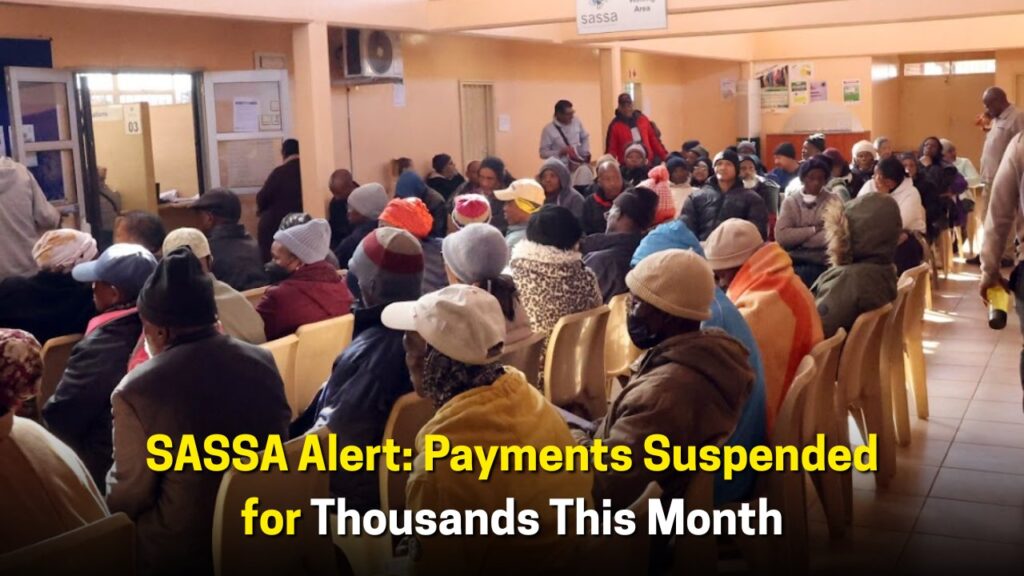Grant Suspensions Shake SASSA: As September 2025 approaches, many South Africans who rely on social grants are concerned about potential disruptions in their payments due to recent suspensions at the South African Social Security Agency (SASSA). The agency, which plays a pivotal role in providing financial aid to millions, has faced challenges that could affect disbursements. These developments have sparked widespread unease among beneficiaries, prompting questions about the security of their much-needed funds. With livelihoods at stake, understanding the root causes and potential outcomes of these suspensions is crucial for all stakeholders.

Understanding the Impact of SASSA Grant Suspensions in September 2025
The suspension of grants by SASSA has sent ripples of concern through communities across South Africa. September 2025 marks a significant moment as many recipients anxiously await news about their payments. The suspensions stem from a complex web of administrative challenges, policy changes, and financial constraints that have been building over recent months. This situation is not just a bureaucratic hurdle; it directly impacts the daily lives of countless individuals who depend on these funds for essentials such as food, healthcare, and education. In light of these challenges, government officials and SASSA administrators are working to resolve issues swiftly, ensuring that beneficiaries receive their payments on time. The agency has outlined several strategies to address these issues, including enhancing their digital infrastructure to streamline processes and improve communication with beneficiaries. However, the uncertainty remains a pressing concern, and the timely resolution of these suspensions is essential to prevent further hardship.
What Causes SASSA Grant Suspensions and How Can They Be Resolved?
To grasp the reasons behind the recent SASSA grant suspensions, it’s necessary to explore the underlying factors contributing to this predicament. Primarily, administrative inefficiencies have played a significant role. These inefficiencies often arise from outdated systems and a lack of adequate resources, which can hinder the agency’s ability to process payments smoothly. Additionally, policy shifts and budgetary constraints add layers of complexity to an already strained system. Addressing these issues requires a multifaceted approach. Firstly, investing in technology upgrades can enhance operational efficiency, reducing errors and delays in grant distribution. Secondly, increasing budget allocations dedicated to social security can provide the financial flexibility needed to manage unexpected challenges. Lastly, fostering transparent communication between SASSA and its beneficiaries can build trust and reduce anxiety among recipients. By actively addressing these causes, SASSA can work towards a more stable and reliable grant distribution system, ensuring that the September 2025 payments proceed without disruption.
How Beneficiaries Can Prepare for Potential Payment Delays
For those dependent on SASSA grants, preparing for potential payment delays in September 2025 is crucial. Beneficiaries are advised to proactively engage with SASSA through available communication channels to stay informed about any changes or updates regarding their payments. Utilizing digital platforms, such as the SASSA website and social media, can provide timely information and guidance. Additionally, beneficiaries should explore community support networks, such as local NGOs and faith-based organizations, which can offer assistance during periods of financial uncertainty. By building a safety net of resources and information, beneficiaries can better navigate the challenges posed by potential payment suspensions.
The Role of Government and Community in Mitigating SASSA Payment Issues
The role of both government and community organizations is pivotal in mitigating the impact of SASSA payment issues on South African citizens. The government, alongside SASSA, must prioritize addressing the systemic challenges that lead to grant suspensions. This includes not only enhancing the agency’s operational capabilities but also ensuring that there is a robust support system in place for those affected by delays. Community organizations play a complementary role by providing grassroots support and advocacy for beneficiaries. These organizations can offer immediate relief through food banks, financial planning workshops, and emotional support services. Collaboration between government bodies and community entities is key to creating a comprehensive safety net that protects vulnerable populations during times of financial instability. By working together, they can ensure that social grants continue to serve their purpose as a vital lifeline for millions of South Africans.




